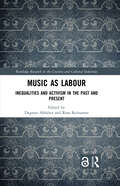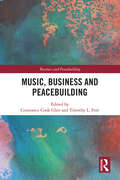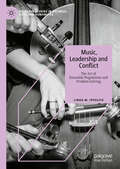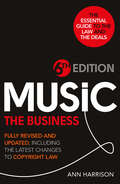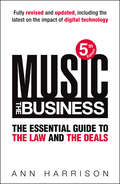- Table View
- List View
Music Law: How to Run Your Band's Business (3rd edition)
by Richard StimStim, a musician and intellectual property attorney, explains the business side of running a band from a legal perspective. He discusses band partnerships and agreements, management, attorneys, equipment, performance and touring, copyright and song ownership, publishing, band names and trademarks, album artwork issues, recording and manufacturing issues, music distribution, independent record agreements, and taxes. This edition covers downloads and other internet issues.
Music Management, Marketing and PR
by Chris Anderton James Hannam Johnny HopkinsThis book is your guide to the study and practice of music management and the fast-moving music business of the 21st century. Covering a range of careers, organisations, and practices, this expert introduction will help aspiring artists, managers, and executives to understand and succeed in this exciting sector. Featuring exclusive interviews with industry experts and discussions of well-known artists, it covers key areas such as artist development, the live music sector, fan engagement, and copyright. Other topics include: Managing contracts and assembling teams. Using data audits of platforms to adapt campaigns. Shaping opinions about music, musicians, events. How the music industry can be more diverse, inclusive, and equitable for the benefit of all. Working with venues, promoters, booking agents, and tour managers. Branding, sponsorship, and endorsement. Funding, crowdsourcing and royalty collection. Ongoing digital developments such as streaming income and algorithmic recommendation. Balancing the creative and the commercial, it is essential reading for students of music management, music business, and music promotion – and anybody looking to build their career in the music industries. Dr Chris Anderton, Johnny Hopkins, and James Hannam all teach on the BA Music Business at the Faculty of Business, Law and Digital Technologies at Solent University, Southampton, UK.
Music Management, Marketing and PR
by Chris Anderton James Hannam Johnny HopkinsThis book is your guide to the study and practice of music management and the fast-moving music business of the 21st century. Covering a range of careers, organisations, and practices, this expert introduction will help aspiring artists, managers, and executives to understand and succeed in this exciting sector. Featuring exclusive interviews with industry experts and discussions of well-known artists, it covers key areas such as artist development, the live music sector, fan engagement, and copyright. Other topics include: Managing contracts and assembling teams. Using data audits of platforms to adapt campaigns. Shaping opinions about music, musicians, events. How the music industry can be more diverse, inclusive, and equitable for the benefit of all. Working with venues, promoters, booking agents, and tour managers. Branding, sponsorship, and endorsement. Funding, crowdsourcing and royalty collection. Ongoing digital developments such as streaming income and algorithmic recommendation. Balancing the creative and the commercial, it is essential reading for students of music management, music business, and music promotion – and anybody looking to build their career in the music industries. Dr Chris Anderton, Johnny Hopkins, and James Hannam all teach on the BA Music Business at the Faculty of Business, Law and Digital Technologies at Solent University, Southampton, UK.
Music Marketing For The Diy Musician: Creating And Executing A Plan Of Attack On A Low Budget (Music Pro Guides)
by Bobby BorgDo it yourself and succeed! More and more artists are taking advantage of new technologies to try and build successful careers. But in this expanding competitive marketplace, serious do-it-yourself musicians need structured advice more than ever. In Music Marketing for the DIY Musician, veteran musician and industry insider Bobby Borg presents a strategic, step-by-step guide to producing a fully customized, low-budget plan of attack for marketing one’s music.
Music Money and Success: The Insider's Guide to Making Money in the Music Business
by Jeff Brabec Todd BrabecThe Insider's Guide to Making Money in the Music Business is the industry bible and the ultimate guide to making money in the music business. Music is a business of money, contracts, decisions and making the most of every opportunity. To succeed—to make money—to have a career—you have to know what you are doing in both music and business. <p><p>This invaluable book tells you how the business works, what you must know to succeed, and how much money you can make in films, television, video games, ASCAP, BMI and SESAC, record sales, downloads and streams, advertising, ringtones and ringbacks, interactive toys and dolls, Broadway, new media, scoring contracts and synch licenses, music publishing, foreign countries, and much more. This indispensable reference is written by industry insiders Todd Brabec, Educator, Entertainment Law Attorney and former ASCAP Executive Vice President and Worldwide Director of Membership, and Jeff Brabec, Vice President of Business & Legal Affairs, BMG.
Music Streaming around the World
by David HesmondhalghA free ebook version of this title is available through Luminos, University of California Press's Open Access publishing program. Visit www.luminosoa.org to learn more. Music streaming platforms such as Spotify, Apple Music, YouTube, and those offered by Chinese web giant Tencent are now central to everyday musical activity across much of the world, with enormous ramifications for musical culture in modern societies. Bringing together case studies from twelve countries, Music Streaming around the World provides the first international account of how streaming is shaping music culture today by considering the implications of streaming platforms for the production, distribution, and consumption of recorded music around the globe.
Music and Capitalism: A History of the Present (Big Issues In Music Ser.)
by Timothy D. TayloriTunes. Spotify. Pandora. With these brief words one can map the landscape of music today, but these aren't musicians, songs, or anything else actually musical--they are products and brands. In this book, Timothy D. Taylor explores just how pervasively capitalism has shaped music over the last few decades. Examining changes in the production, distribution, and consumption of music, he offers an incisive critique of the music industry's shift in focus from creativity to profits, as well as stories of those who are laboring to find and make musical meaning in the shadows of the mainstream cultural industries. Taylor explores everything from the branding of musicians to the globalization of music to the emergence of digital technologies in music production and consumption. Drawing on interviews with industry insiders, musicians, and indie label workers, he traces both the constricting forces of bottom-line economics and the revolutionary emergence of the affordable home studio, the global internet, and the mp3 that have shaped music in different ways. A sophisticated analysis of how music is made, repurposed, advertised, sold, pirated, and consumed, Music and Capitalism is a must read for anyone who cares about what they are listening to, how, and why.
Music and Copyright: Romanticism And Copyright In The Music Industry (Law And Society Ser.)
by Simon Frith Lee Marshall"First Published in 2004, Routledge is an imprint of Taylor & Francis, an informa company."
Music and Leadership: The Nature and Role of Aesthetics in Orchestrating Successful Organizations (Leadership Horizons)
by David M. ToledoMusic and Leadership: The Nature and Role of Aesthetics in Orchestrating Successful Organizations explores how music can offer fresh insight into the practice of leadership. Moving beyond traditional models focused solely on strategy and systems, the book argues that leadership is also a performative and aesthetic act. It requires timing, emotional awareness, and the ability to shape meaning. Drawing on influential works of Western classical music by Bach, Beethoven, and Stravinsky, this book demonstrates how great composers model distinct leadership approaches in moments of cultural change. The book pairs these musical case studies with well-known modern leaders such as Steve Jobs, Leonard Bernstein, and Condoleezza Rice, who illustrate how aesthetic habits can shape public influence and organizational success.At the heart of the book is the Orchestrating Success Framework, which translates core musical concepts such as motif, harmony, rhythm, and silence into practical leadership tools. Accessible to readers in business, education, and the arts, this book bridges the humanities and leadership studies in a compelling and original way. With its interdisciplinary approach and clear applications, Music and Leadership is both a challenge and an invitation to lead not just with plans and metrics but also with artistry, presence, and imagination.
Music and Tourism
by Chris Gibson John ConellMusic and Tourism is the first book to comprehensively examine the links between travel and music. It combines contemporary and historical analysis of the economic and social impact of music tourism, with discussions of the cultural politics of authenticity and identity. Music tourism evokes nostalgia and meaning, and celebrates both heritage and hedonism. It is a product of commercialisation that can create community, but that also often demands artistic compromise. Diverse case studies, from the USA and UK to Australia, Jamaica and Vanuatu, illustrate the global extent of music tourism, its contradictions and pleasures.
Music and the (Real) World: Thirty Years of MTV
by Mukti Khaire Eleanor KenyonThe case is useful for teaching students the structure of creative industries and the issues to consider when attempting disruptive innovation and entrepreneurship in these industries.
Music as Intangible Cultural Heritage: Economic, Cultural and Social Identity (SpringerBriefs in Economics)
by Virginia Santamarina-Campos Blanca de-Miguel-Molina María de-Miguel-Molina Rafael Boix-DoménechThis open access book offers an interdisciplinary perspective and presents various case studies on music as ICH, highlighting the importance and functionality of music to stimulating social innovation and entrepreneurship. Intangible Cultural Heritage (ICH) covers the traditions or living expressions proposed by the 2003 Convention for the Safeguarding of the Intangible Cultural Heritage in five areas, including music. To understand the relationship between immaterial and material uses and inherent cultural landscapes, this open access book analyzes the symbolic, political, and economic dimensions of music. The authors highlight the continuity and current functionality of these artistic forms of expression as well as their lively and changing character in continuous transformation. Topics include the economic value and impact of music, strategies for social innovation in the music sector, music management, and public policies to promote cultural and creative industries.
Music as Labour: Inequalities and Activism in the Past and Present (Routledge Research in the Creative and Cultural Industries)
by Dagmar AbfalterThis book brings together research at the intersection of music, cultural industries, management, antiracist politics and gender studies to analyse music as labour, in particular highlighting social inequalities and activism. Providing insights into labour processes and practices, the authors investigate the changing role of manifold actors, institutions and technologies and the corresponding shifts in the valuation and evaluation of music achievements that have shaped the relationship between music, labour, the economy and politics. With research into a variety of geographic regions, chapters shed light on the various ways by which musicians’ work is performed, constructed and managed at different times and show that musicians’ working practices have been marked by precarity, insecurity and short-term contracts long before capitalism invited everybody to ‘be creative’. In doing so, they specifically examine the dynamics in music professions and educational institutions, as well as gatekeepers and mechanisms of inclusion and exclusion. With a specific emphasis on inequalities in the music industries, this book will be essential reading for scholars seeking to understand the collective actions and initiatives that foster participation, inclusion, diversity and fair pay amongst musicians and other workers.
Music in Orbit: Satellite Radio in the Streaming Space Age
by Brian FauteuxYears before the advent of music streaming, Sirius and XM established satellite radio services that attracted paying subscribers through their ever-expanding lineup of niche music channels and exclusive celebrity-hosted programming. Music in Orbit is the first book to explore how satellite radio bridges legacy broadcast music radio and streaming platforms, serving as both precursor and integral player in today's streaming media environment. Arguing for the ongoing significance of radio in the digital age and the pernicious effects of monopoly power on the vibrancy of contemporary music industries, Music in Orbit offers essential context for the serious problems now facing working musicians, music consumers, and music communities.
Music in the Marketplace: A social economics approach
by Samuel CameronMuch recent economic work on the music industry has been focused on the impact of technology on demand, with predictions being made of digital copyright infringement leading to the demise of the industry. In fact, there have always been profound cyclical swings in music media sales owing to the fact that music always has been, and continues to be, a discretionary purchase. This entertaining and accessible book offers an analysis of the production and consumption of music from a social economics approach. Locating music within the economic analysis of social behaviour, this books guides the reader through issues relating to production, supply, consumption and trends, wider considerations such as the international trade in music, and in particular through divisions of age, race and gender. Providing an engaging overview of this fascinating topic, this book will be of interest and relevance to students and scholars of cultural economics, management, musicology, cultural studies and those with an interest in the music industry more generally.
Music, Business and Peacebuilding (Business and Peacebuilding)
by Timothy L. Fort Constance Cook GlenBusiness schools are placing more emphasis on the role of business in society. Top business school accreditors are shifting to mandating that schools teach their students about the social impact of business, including AACSB standards to require the incorporation of business impact on society into all elements of accredited institutions. Researchers are also increasingly focused on issues related to sustainability, but in particular to business and peace as a field. A strong strain of scholarship argues that ethics is nurtured by emotions and through aesthetic quests for moral excellence. The arts (and music as shown specifically in this book) can be a resource to nudge positive emotions in the direction toward ethical behavior and, logically, then toward peace. Business provides a model for positive interactions that not only foster long-term successful business but also incrementally influences society. This book provides an opportunity for integration and recognition of how music (and other art forms) can further encourage business toward the direction of peace while business provides a platform for the dissemination and modeling of the positive capabilities of music toward the aims of peace in the world today. The primary market for this book is the academic audience. Unlike many other academic books, however, the interdisciplinary nature of the book allows for multiple academic audiences. Thus, this book reaches into schools of music, business, political science, film studies, sports and society studies, the humanities, ethics and, of course, peace studies.
Music, Higher Education, and Society: Leading Change through Music’s Essential Goodness (CMS Emerging Fields in Music)
by David E. MyersThis volume asserts that institutional teaching, study, administration, and performance of music should derive from essential goodness: the transcendent value embodied in meaning-making that is manifest through holistic cognitive, creative, kinesthetic, productive, and expressive reality.The classical music ecosystem suffers from a legacy of survival, rather than flourishing across increasingly diverse audiences among whom personal and shared meaning is the crux of perceived value. Myers calls for a renaissance in professional education and practice that embeds rigorous and disciplined adherence to essential goodness as a non-negotiable premise. Change leadership is essential if classical music and musicians are to offer society the value it deserves through the classical arts, and administrators, boards, funders, and artists must adopt attitudes of service to this greater good in order to invite and lead participatory, co-creative engagement. Through critical analysis of the longstanding status quo, Myers offers powerful suggestions for change beginning in higher education and flowing through applications across society.Contextualizing music higher education within wider ecosystems of teaching and practice, this book shows how leaders can embrace strategic change as a positive opportunity and offers new models for addressing contemporary challenges in a mission-driven way, including preparing musicians for careers and engaging communities.
Music, Leadership and Conflict: The Art of Ensemble Negotiation and Problem-Solving (Palgrave Studies in Business, Arts and Humanities)
by Linda M. IppolitoThis book is the first in the field to explore the use of music in negotiation, conflict resolution and leadership development. Presenting grounded empirical data, it examines how adopting an ensemble approach to negotiation and problem-solving might assist in shifting adversarial combative and competitive frames towards a collaborative mindset. The book introduces a music-based cognitive metaphor and music-based pedagogy into the study of negotiation and problem-solving, considering the impact of arts-based learning strategies on the theory and practice of dispute resolution and enriching readers’ understanding of the design and implementation of such strategies. Specifically focused upon the rise of arts-based learning in professional business management education and training, this book explores the need for foundational change in conflict culture and leadership development, and how we might achieve it.
Music, Movies, Meanings, and Markets: Cinemajazzamatazz (Routledge Interpretive Marketing Research)
by Morris HolbrookMusic, Movies, Meanings, and Markets focuses on macromarketing-related aspects of film music in general and on the cinemusical role of ambi-diegetic jazz in particular. The book examines other work on music in motion pictures which has dealt primarily with the traditional distinction between nondiegetic film music (background music that comes from off-screen and is not audible to the film’s characters, to further the dramatic development of plot, character, or other themes) and diegetic music (source music produced on-screen and/or that is audible to the film’s characters, adding to the realism of the mise-en-scène without contributing much to other dramatic meanings). This book defines, describes, and illustrates another hitherto-neglected type of film music –ambi-diegetic film music, which appears on-screen but which contributes to the dramatic development of plot, character, and other themes. Consistent with an interest in macromarketing, such ambi-diegetic film music serves as a kind of product placement (suitable for commercialization via the cross-promotion of soundtrack albums, for example) and plays a role in product design. It also provides one type of symbolic consumer behavior that indicates choices made by film characters when playing-singing-listening-or-dancing in ways that reveal their personalities or convey other cinemusical meanings. Morris Holbrook argues that ambi-diegetic film music sheds light on various social issues –such as the age-old tension between art and entertainment as it applies to the contrast between creative integrity and commercialization. Music, Movies, Meanings, and Markets explores the ways in which ambi-diegetic jazz contributes to the development of dramatic meanings in various films, many of which address the art-versus-commerce theme as a central concern.
Music, Radio and the Public Sphere
by Charles FairchildRadio, the most widely used medium in the world, is a dominant mediator of musical meaning. Through a combination of critical analysis, interdisciplinary theory and ethnographic writing about community radio, this book provides a novel theorization of democratic aesthetics, with important implications for the study of old and new media alike.
Music: Fully revised and updated, including the latest changes to Copyright law
by Ann HarrisonThis essential and highly acclaimed guide, now updated and revised in its sixth edition, explains the business of the British music industry. Drawing on her extensive experience as a media lawyer, Ann Harrison offers a unique, expert opinion on the deals, the contracts and the business as a whole. She examines in detail the changing face of the music industry and provides absorbing and up-to-date case studies. Whether you’re a recording artist, songwriter, music business manager, industry executive, publisher, journalist, media student, accountant or lawyer, this practical and comprehensive guide is indispensable reading. Fully revised and updated. Includes: The current types of record and publishing deals, and what you can expect to see in the contracts A guide to making a record, manufacture, distribution, branding, marketing, merchandising, sponsorship, band arrangements and touring The most up-to-date information on copyright law and related rights An in-depth look at digital downloads, streaming, online marketing and piracy Case studies illustrating key developments and legal jargon explained.
Music: The Business (8th edition)
by Ann HarrisonThis essential and highly acclaimed guide, now updated and revised in its eighth edition, explains the business of the British music industry.Drawing on her extensive experience as a media lawyer, Ann Harrison offers a unique, expert opinion on the deals, the contracts and the business as a whole. She examines in detail the changing face of the music industry and provides absorbing and up-to-date case studies.Whether you're a recording artist, songwriter, music business manager, industry executive, publisher, journalist, media student, accountant or lawyer, this practical and comprehensive guide is indispensable reading.Fully revised and updated. Includes:· The current types of record and publishing deals, and what you can expect to see in the contracts· A guide to making a record, manufacture, distribution, branding, marketing, merchandising, sponsorship, band arrangements and touring· Information on music streaming, digital downloads and piracy· The most up-to-date insights on how the COVID-19 crisis has affected marketing· An in-depth look at copyright law and related rights· Case studies illustrating key developments and legal jargon explained.
Music: The Essential Guide to the Law and the Deals
by Ann HarrisonThis essential and highly acclaimed guide, now updated and revised in its fifth edition, explains the possibilities and pitfalls of the British music industry, from the developments in new media, privacy, sponsorship and sampling to the expanding role of the internet and the dominance of digital music. Drawing on her extensive experience as a media lawyer, Ann Harrison offers a unique, expert opinion on the deals, the contracts and the business as a whole. She examines in detail the changing face of the music business and provides absorbing case studies of huge stars such as Robbie Williams, Ms Dynamite and Elvis Presley. Fascinating, practical and comprehensive, this is the bible for the music industry and indispensable reading for any musical entrepreneur.
Musik & Krisen (Jahrbuch für Musikwirtschafts- und Musikkulturforschung)
by Holger Schwetter Lorenz Grünewald-Schukalla Carsten Winter Anita Jóri Steffen Lepa Barbara HornbergerDie vergangenen Jahre waren für Musikkultur und Musikwirtschaft durch tiefe Krisen gekennzeichnet. Die Maßnahmen gegen die Covid-19 Pandemie griffen nicht nur tief in den Alltag der Menschen ein, sondern mit der zeitweisen Absage jeglicher Clubveranstaltungen, Festivals und dem öffentlichen Konzertwesen kam ausgerechnet jener Bereich komplett zum Erliegen, der in den Jahren davor ein starkes Wachstum verzeichnet hatte und im Tonträgermarkt wegbrechende Einnahmen kompensierte. Für viele AkteurInnen der Branche ist damit zumindest kurzfristig die gesamte Existenzgrundlage zusammengebrochen. Der vorliegende Band richtet sich an ForscherInnen wie auch PraktikerInnen aus Musikwirtschaft und Musikkultur und betrachtet das Thema aus diesem Anlass einmal ganz grundlegend. Denn Musik kann auch und gerade in Krisenzeiten vielfältige Rollen spielen: Sie kann Stellung beziehen, Trends thematisieren oder geteilten Emotionen eine Form geben. Zugleich steckt in jeder Krise ein transformatorisches Potential: Krisen beschleunigen Entwicklungen und können hierzu leider auch missbraucht werden. Der Band liefert Beiträge zu Fragen wie: Wie haben MusikkünstlerInnen auf die Corona-Situation reagiert? Wie verändern sich gegenwärtig der Musikmarkt und Musikkulturen? Welche Rolle spielt (und spielte) Musik in Transformationsprozessen, die durch Krisen ausgelöst werden?
Musik & Marken (Jahrbuch für Musikwirtschafts- und Musikkulturforschung)
by Holger Schwetter Lorenz Grünewald-Schukalla Anita JóriSpätestens seit den frühen Formationen einer auf Notendrucken basierenden Musikindustrie unterhalten musikferne Unternehmen Beziehungen zu Musik und ihren Akteur*innen. Damals wurden vornehmlich Kosmetik und Tabakprodukte in Notenbüchern beworben. Heute jedoch haben sich die Formen, bei denen Musik in den kommerziellen Aktivitäten musikferner Akteur*innen eine Rolle spielt, ausdifferenziert. Gleichzeitig hat der Markt für Aktivitäten wie Sponsoring oder Werbung an Volumen zugenommen. Hierbei spielen Marken eine besondere Rolle. Um Marken aufzubauen publizieren Unternehmen Musikmagazine, vertreiben Tonträger, organisieren und streamen Konzerte oder nehmen gar Künstler*innen mit eigenen Labels unter Vertrag. Gleichzeitig werden auch Künstler*innen und Bands durch die Musikindustrie immer stärker als Marken aufgebaut. Das Jahrbuch der GMM „Musik & Marken“ sondiert die Forschung zu Musik und Marken, versammelt empirische Befunde und zeigt neue Forschungsperspektiven in der Untersuchung von „Musik & Marken“ auf.











